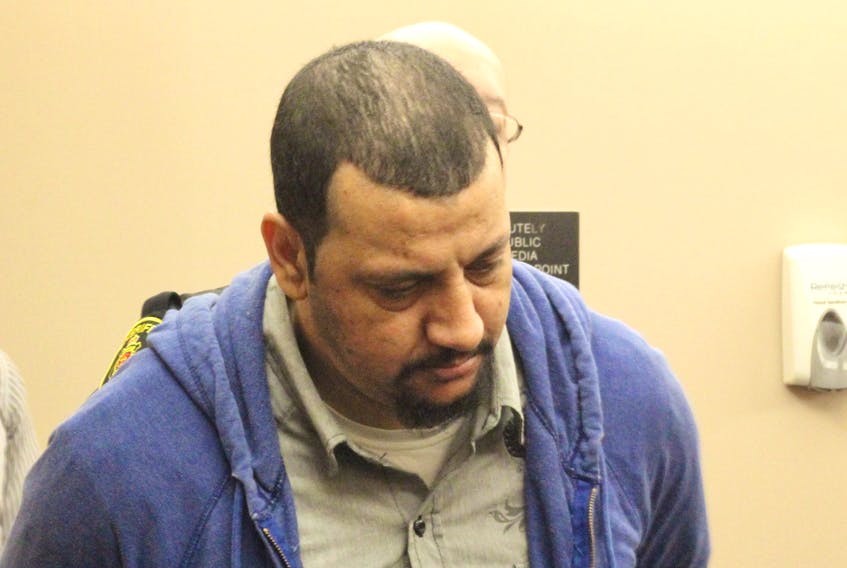Graphic content warning: this story contains details of sexual assault that some readers may find upsetting.
Having spent almost a decade holding her breath, waiting for the next news from the justice system about Sofyan Boalag, a survivor of one of his attacks was quick to find a word to describe her emotions Thursday: relief.
“(I’m) relieved that it’s finally over with and I don’t have to deal with his B.S. of trying to manipulate the system anymore,” the woman told The Telegram after Boalag’s bid to overturn his dangerous offender status came to an end.
“Seven or eight years is too long to be able to manipulate the justice system,” the woman said. “He has to deal with the consequences now.”
The consequences of Boalag’s serious crimes — sexually assaulting two women and a child in separate attacks as they walked home from the downtown area in 2012, robbing the girl and one of the women and choking the other woman until she was unconscious, while armed with a stick in one case and a knife in the others – include a dangerous offender designation and an indeterminate jail sentence.
And they will continue, the province’s court of appeal has ruled.
Dangerous offender status in Canada is reserved for sexual predators and otherwise violent criminals, when the Crown is able to prove a high risk of the offender committing other serious offences in the future. The designation comes with an automatic indefinite jail sentence with no chance of parole for seven years.
While dangerous offenders serving indeterminate sentences are eligible to apply for parole after seven years — and every two years after that — parole is rarely granted. In cases where a dangerous offender is granted parole, they remain bound by strict conditions for life.
Boalag was convicted and deemed a dangerous offender by a provincial court judge and sent to Atlantic Institution to serve his indeterminate jail sentence.
Earlier this year Boalag appealed the designation, with his lawyer arguing that when it came to assessing Boalag’s level of risk, he didn’t belong in the dangerous offender category.
A 10- to 12-year jail sentence was more appropriate, argued defence lawyer Jon Noonan.
“I would suggest that these offences, while horrific, are fairly minor on the scale of dangerous offender predicate offences,” Noonan told the panel of three judges in the Newfoundland and Labrador Court of Appeal, comparing the case to previous unrelated sexual assault convictions of other offenders.
Noonan also pointed out Boalag had no criminal history to suggest he was deviant or violent before 2012.
“These are horrific offences, however dangerous offender (status) is the most severe designation in Canada and it’s reserved for the worst of the worst.”
Justice Gale Welsh disagreed with Noonan on the spot.
“Yes but Mr. Noonan, if you look what happened,” she said. “The fact that he wasn’t caught or didn’t do it before, how does that impact the fact that you have these three really violent and very disturbing attacks in such a short period of time?”
Two of the survivors of Boalag’s crimes told The Telegram at the time of the appeal they were shocked and hurt by the defence’s arguments. There was nothing minor about what Boalag did to them, they said.
“I don’t even know how (Noonan) can use that word,” one woman said. “I thought I was going to die. It wasn’t minor. It was a sexual assault with a weapon.”
Prosecutor Dana Sullivan called Noonan’s arguments offensive and argued Boalag had been found by the original judge to meet all four criteria for a dangerous offender, even though only one would have sufficed for the designation. Sullivan argued in favour of Boalag’s dangerous offender status and indeterminate prison sentence, pointing out the attacks included a high degree of violence with weapons and Boalag had grabbed the women from public locations, bringing them to secluded areas to commit the violence upon them.
The appeal judges released their unanimous decision late Wednesday and dismissed Boalag’s appeal.
They agreed the original judge had erred in applying a less stringent standard when determining Boalag was a dangerous offender, following an outdated law that required a “likelihood” of Boalag causing future harm to others instead of the updated law, which requires a pattern of behaviour that is “substantially or pathologically intractable.”
However, the appeal judges agreed, it doesn’t make a difference since Boalag fits the criteria either way.
“I am satisfied that applying the correct standard leads to the same conclusion and that no substantial wrong or miscarriage of justice resulted,” wrote Justice Gale Welsh. Justices Francis O’Brien and William Goodridge concurred.
Noonan declined comment when contacted by The Telegram Thursday. Sullivan said she was pleased with the decision.
“I’m satisfied with the result. I think the Court of Appeal applied the law correctly,” she said. “It’s a good result.”
While some members of the public have suggested deporting Boalag to his native Algeria as a sentence for his crimes, it’s not an option.
Judges in criminal matters have no authority in that context to order an offender’s deportation; they are bound by the Canadian Criminal Code in terms of sentencing. It’s the Canada Border Service Agency that has the authority to deport foreign nationals or permanent residents who have committed serious crimes and deportation orders aren’t acted upon until an offender is released from prison, except in rare cases where Canada has an agreement with an offender’s native country and the offender can serve their sentence there.
Immigration officials have already indicated Boalag will be deported if he’s released from prison.
--
The Newfoundland and Labrador Sexual Assault Crisis and Prevention Centre offers a 24-hour, seven-day-a-week support and information line for survivors of sexual violence: 1-800-726-2743









